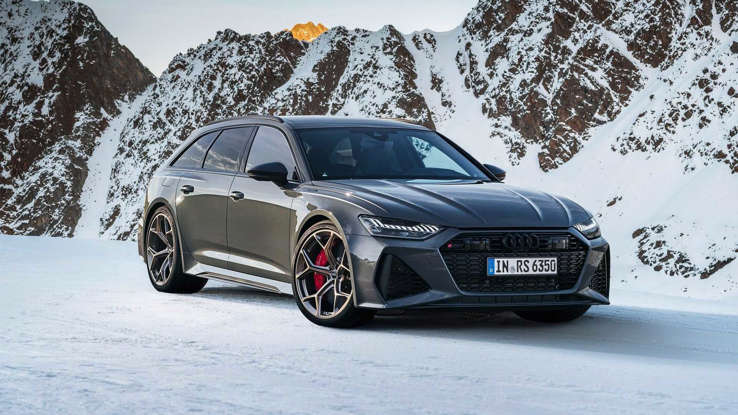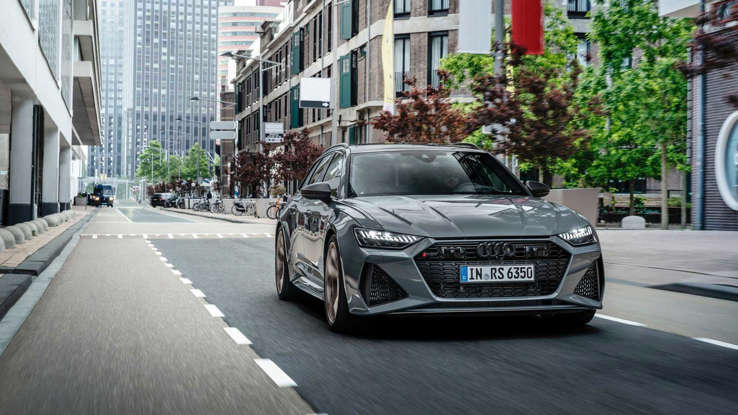
The hotter version also comes with a new self-locking center differential.
Audi has pledged to only introduce electric vehicles from 2026, but there’s still life left in the ol’ internal combustion engine. To level up the RS6 Avant and RS7 Sportback, the Four Rings are introducing a hotter Performance derivative with an upgraded version of the twin-turbo, 4.0-liter engine. The potent TFSI V8 now makes 621 horsepower (463 kilowatts) and 850 Newton-meters (625 pound-feet) of torque delivered to a Quattro system.
Ingolstadt’s engineers have therefore lifted output by 30 hp and 50 Nm (35 lb-ft) compared to the standard models. Courtesy of the newly unlocked muscle, the dynamic duo from Audi can now sprint to 62 mph (100 km/h) from a standstill in only 3.4 seconds or two-tenths of a second quicker than before. The RS6 Performance and RS7 Performance get the RS Dynamic Package as standard, increasing top speed to 174 mph (280 km/h) and adding rear-wheel steering.
Aside from having a reworked engine, the RS6 Avant and RS7 Sportback receive a newly developed lighter and smaller self-locking center differential. Its job is to route the engine’s power in a rear-biased ratio as 60 percent of the output is channeled to the back in normal driving conditions. Depending on the amount of traction available, up to 85 percent can be transferred to the rear wheels or a maximum of 70 percent to the front axle. This new hardware sharpens handling during cornering and diminishes the risk of understeering when the cars are being pushed hard.
The Performance models are fitted as standard with 21-inch cast aluminum wheels upgradable to a 22-inch set. The novelty here is represented by a 22-inch lightweight made using a high-tech forging-milling process to shave off about five kilograms (11 pounds) of weight compared to the regular 22-inch wheel.
Consequently, a weight reduction of 20 kg (44 lbs) is achieved. These new wheels come with Continental Sport Contact 7 285/30 tires promising to deliver better grip on both dry and wet roads while reducing the distance needed to come to a full stop from 62 mph (100 km/h) by two meters (6.5 feet).
A further 34 kg (75 lbs) can be removed by getting the ceramic brakes to replace the standard steel set. Measuring 440 mm front and 370 mm rear, the lighter brakes with red, blue, or gray calipers are part of the optional RS Dynamic Package Plus, which also raises the top speed to 190 mph (305 km/h).
The RS6 Avant and RS7 Sportback in Performance guise can be had with a choice between 16 exterior colors, including the new Ascari Blue with a matte or metallic finish and a matte-only Dew Silver. To set the cars apart from the regular models, Audi paints some of the parts in matte gray: front spoiler and front side flaps, mirror caps, side sill inserts, roof rails, side window trim, and rear diffuser. Alternatively, an optional matte carbon/black optics package darkens the side window trim and roof rails while the chrome Audi logo can be painted in black as well.
Not much has changed on the inside where the two RS models now have blue contrasting accents and several RS design packages to choose from. The seats are wrapped in perforated Valcona leather upholstery with honeycomb stitching while the side of the center console and the selector lever knob are covered in Dinamica microfiber. It’s a material that uses roughly 45 percent recycled PET fibers.
For the 12.3-inch digital driver’s display, Audi has embedded a blinking shift indicator when the eight-speed tiptronic transmission is in manual mode. These also show up when the launch control system is activated by illustrating the perfect moment to accelerate off the line. As a final touch, LED projectors mounted in the front doors display the “RS Performance” lettering.
Pricing for the US market has yet to be disclosed, but expect to pay more than a standard 2023 RS6 Avant available from $118,900. The regular 2023 RS7 Sportback starts at $120,900.







